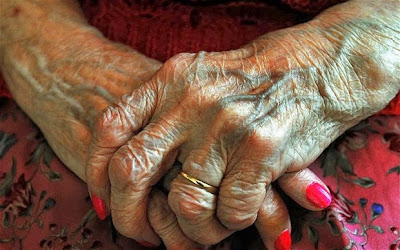There are a host of topics to which I am particularly sensitive. Some people call them hot button issues. For instance, I detest the mentality which characterizes men as nothing more than bumbling oafs incapable of putting their pants on correctly. So prevalent is this thinking that it has become the punchline to many ad campaigns and the premise for entire sitcoms such as Everybody Loves Raymond. When I hear or read anything in that vain it makes my blood boil. Other people with other hot button issues may not even notice.
I was reading an article today and felt my blood begin to similarly boil over another of my hot button issues. The New York Times has a senior blog titled The New Old Age. It is a fascinating compilation of stories and articles related to aging and caregiving. Most of what I find there is top quality. Today's find left the door open to something I greatly fear.
This particular article was about trying to predict the aftermath of a fall. Falls are incredibly common among the elderly with one out of every three adults over the age of 65 taking a tumble each year. Falls are especially dangerous for the elderly due to lower bone density and thinner skin. Even a minor trip can be a life altering event for some seniors.
In the article, the author points to a study conducted by researchers at Yale who tracked almost 800 older adults over a period of 14 years. The subjects were tested and measured closely in order to track their levels of disability both before and after a fall. Not surprisingly, those individuals who were most active and had the least amount of impairment before a fall made the quickest and fullest recovery. Those who were physically struggling before posed a much greater challenge in terms of rehabilitation. All in all, the researchers found that predicting the aftermath of a fall was not a difficult task.
At this point in the article, I was still on board. I understand the realities of rehabilitation when it comes to seniors who are already struggling physically. At Home Instead Senior Care, encouraging an active independent lifestyle is at the core of what we do. It is critical not simply for the emotional benefits but also because of the physical resiliency it produces. However, there was one point in the article which really stood out to me and my hot button.
Let me first say that I am a strong advocate for palliative care. I have seen, first-hand, the blessing that palliative or comfort care can be in some of the most difficult situations."With so little prospect of recovery for those with greater disability, however, “perhaps the goals of care should shift,” Dr. Gill suggested. Palliative care — helpful in reducing the pain that often accompanies fall injuries — might make more sense, while extended physical therapy might be of little help."
To a passerby, this paragraph may not seem that insidious. It may not have even been intended in that manner. However, it is important to pair these remarks with the current socio-political climate regarding issues of aging in this country. We are facing unprecedented challenges. There are not enough facilities to house seniors who need significant living assistance. There are not enough hospital beds to accommodate the number of seniors facing chronic or traumatic illnesses. There are not enough geriatricians to treat the seniors desperately in need of doctors who understand the very different ways in which their bodies work. In short, something's gotta give. While the concept of rationing care has been recently tied to alarmist rhetoric, it is an almost certain reality unless substantial progress is made on these issues both in the United States and around the world.
To clarify, there are certainly times when an individual and their family must have the courage to acknowledge the trajectory of their situation. We do not have immortal bodies and at some point things just wear out. For some seniors, attempting an extensive rehab and physical therapy regime might not make sense. But each decision should be a personal one and not dictated by lack of availability or some economist telling a senior that they are too old or too frail to waste money on an attempted recovery.
Our seniors deserve better than a system whose only solution to dementia is confinement. They deserve better than being medicinally sedated when they become confused or unruly. They deserve a system which recognizes that dosing an octogenarian with narcotic pain relievers following a fall can have a life altering effect on a body that is no longer able to process those kinds of substances. All the way around, they deserve better.
Every day, I am blessed to partner with seniors who have refused to accept what the flawed system has presented them. They defy the overly-intelligent academics who attempt to dictate what their future will hold. They insist that a diminished quality of life is not an acceptable diagnosis. And they fight to prove to a increasingly doubting world that they still have worth and value despite their advancing years. This is their war and I am proud to fight by their side.
In truth, there is no perfect solution. There never will be. Life does not allow us that simplicity. It is, by its very nature, unpredictable. The journey is the adventure.. No study can predict it and it is to each person as unique as it is beautiful. How many adventures will we prevent by telling seniors to give up: that their journey has already ended?
To read the full article click here: http://newoldage.blogs.nytimes.com/2013/11/15/predicting-a-falls-aftermath/?_r=0

No comments:
Post a Comment